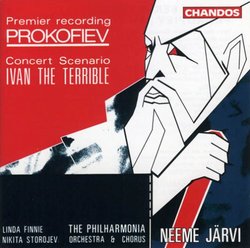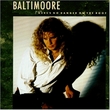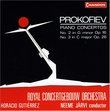| All Artists: Sergey Prokofiev, Neeme Järvi, Linda Finnie, Nikita Storojev, The Philharmonia & Philharmonia Chorus Title: Sergey Prokofiev: Ivan the Terrible - Concert Scenario - Neeme Järvi / The Philharmonia Members Wishing: 0 Total Copies: 0 Label: Chandos Release Date: 10/28/1992 Genres: Soundtracks, Classical Style: Symphonies Number of Discs: 1 SwapaCD Credits: 1 UPC: 095115897720 |
Search - Sergey Prokofiev, Neeme Järvi, Linda Finnie :: Sergey Prokofiev: Ivan the Terrible - Concert Scenario - Neeme Järvi / The Philharmonia
 | Sergey Prokofiev, Neeme Järvi, Linda Finnie Sergey Prokofiev: Ivan the Terrible - Concert Scenario - Neeme Järvi / The Philharmonia Genres: Soundtracks, Classical
|
Larger Image |
CD DetailsSimilar CDs
|
CD ReviewsIvan the Terrible is good Russ | Richmond, VA | 09/06/2006 (5 out of 5 stars) "Around 1941, the film director Sergei Eisenstein began to plan a film about the life of Ivan IV of Russia ("Ivan the Terrible"). Sergei Prokofiev (1891-1953), who had composed the score to Eisenstein's film, Alexander Nevsky, began to collaborate with Eisenstein on the project in 1942. Ivan the Terrible was initially to be a three part film. Part I was praised by the Soviet authorities, but Part II was banned due to its dubious depiction of Ivan (Stalin apparently thought of himself as a modern day Ivan). Subsequent to this, plans for Part III were abandoned.
There are multiple versions of Prokofiev's "Ivan" music floating around out there. The present release is a concert scenario crafted by Christopher Palmer. Prokofiev would have created his own concert version, except that the later part of Prokofiev's life was so turbulent. The best known version of the Ivan the Terrible music was published by Abram Stasevich (the conductor of film's soundtrack), who introduced a narrator to link the different movements together. The version on the present release, thankfully, eliminates the narration, which served to distract the listener from Prokofiev's music. Prokofiev's score for Ivan, much like is score for Alexander Nevsky, is a blend of orchestral, orchestral plus choral, and aria-like movements. Similar to Alexander Nevsky, the music is riveting and dramatic. Things start off with a bang in the Overture (Track 1), beginning with a torrent of violin runs laying the foundation for the brass-heavy "Ivan" theme, which is heroic, yet contains an element of bombast with the inclusion of heavily accented tonicizations (a Prokofiev calling card). Another favorite is the Polonaise (Track 12) with its delightfully charming Prokofievian woodwind melody and beautiful central theme. Also notable is "The Storming of Kazan" movement (Track 9), with an overzealous tuba player depicting an approaching army. This movement does eventually settle down, and a lovely central theme is heard equal in melodiousness to anything out of Prokofiev's Romeo and Juliet. The concluding battle music in this movement, featuring a wide array of percussion instruments and technically difficult orchestral writing is quite thrilling as well. I could go on, but suffice it to say fans of Prokofiev will find much to like in this music; although I do find the quicker sections more interesting than some of the slower movements. The sound quality here is quite good and the Philharmonia Orchestra and Chorus, under the direction of Neemi Jarvi (a great Prokofiev conductor), play marvelously. The program notes are sufficiently detailed and an English translation of the choral parts is included. In conclusion, this version is a must-have for Prokofiev fans. Although, I would recommend that listeners first explore the slightly more tuneful Alexander Nevsky score, as well as Prokofiev's powerful "October" cantata before acquiring this release. 59:06" |

 Track Listings (19) - Disc #1
Track Listings (19) - Disc #1


